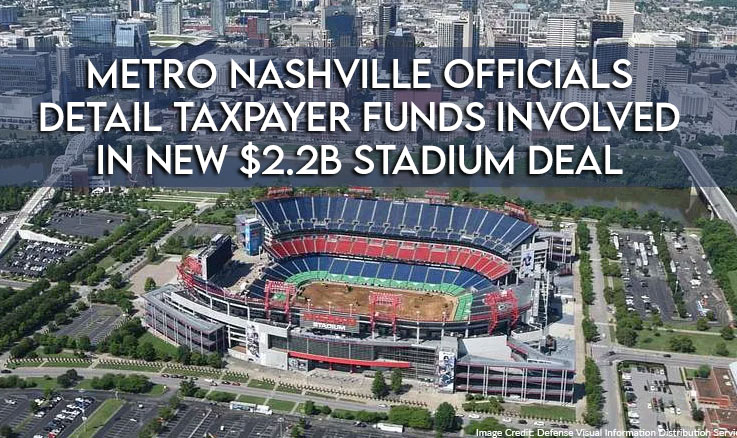Image Credit: Defense Visual Information Distribution Service / Public Domain
The Center Square [By Jon Styf] –
Metro Nashville wasn’t ready to say how much, but officials hinted that a tax increment financing district to provide further public funding to a new Titans stadium district could be discussed starting in October.
Metro officials said at a Wednesday night meeting of the East Bank Stadium Committee that a deal on a new estimated $2.2 billion stadium for the Tennessee Titans to replace Nissan Stadium, which opened in 1999, is not complete and so they would not provide any specifics on the proposals.
That means that the committee canceled most of the rest of its planned meetings pending a stadium agreement announcement. It will meet on Nov. 9, however, to review a $250,000 study of Metro’s financial obligations under its current lease from Venue Solutions Group.
Metro did confirm that the city’s sports authority would be seeking revenue bonds to pay for the stadium out of public tax money assigned to the stadium by Tennessee’s Legislature.

The stadium project is set to receive $1.5 billion in public funding, with $500 million bonded by Tennessee and the other billion in revenue bonds paid for through taxes on sales at the stadium and half of the taxes from sales on a yet-to-be determined 130 acres of development outside the stadium along with a 1 percentage point increase in a hotel-motel tax in Davidson County.
Without providing details, however, Metro Deputy Mayor for Policy and Innovation Sam Wilcox claimed the Titans would be paying for the majority of the stadium just before Metro Director of Finance Director Kelly Flannery detailed the public funds that would pay for the revenue bonds.
Flannery said the numbers will be reviewed by an independent auditor before the bonds are sold because “bondholders aren’t just going to believe us.” She also said Metro is attempting to have bonds that Metro is not responsible to back with general funds if the tax funds fall short. She also said Metro is negotiating, as part of the deal, what will happen if the sales tax funds in the deal exceed expectations.
Wilcox said that the main tax funds going to the stadium project are required to be spent on the stadium and overages in the public tax funds would be used toward ongoing maintenance at the stadium, something that Metro has previously said would be the Titans’ responsibility.
“We’ve seen some speculation in the media that Metro’s stadium construction contribution is going to be $1 billion,” Wilcox said. “That is not accurate. While we are not prepared to share final numbers today, what we are committed to is that the Titans and private sources will be the single-largest funder of the stadium project.”

Economists who have studied professional sports stadiums and mixed-use developments have consistently shown that these projects do not bring significant new spending to an area but instead divert spending from other areas of a municipality where those taxes were collected by the local state, city and county. Giving those funds to a private entity would then have the same financial impact as sending money to that entity from a general fund.
“It’s a misnomer to say that it’s not raising taxes on locals because what you’re doing is transferring commerce that was already taking place in Nashville that was generating sales tax revenue for the city and state and then diverting that to the Titans,” economist J.C. Bradbury of Kennesaw State University previously said about Nashville’s narrative on funding. “So that’s revenue that was previously going to funding other priorities for government that now has to be made up through other means.”
What is less certain is how much public funding will go toward the new multi-use project surrounding the stadium, which was previously termed a private investment. Wilcox said that using TIF funding for that project, as well as what 130 acres will be included, is still being negotiated.
Metro Director of Law Tom Cross said that the stadium deal would be the largest Metro has dealt with. Cross said that Metro’s council will be asked to approve five items with the project, including a stadium development agreement, Titans lease, guaranty, non-relocation agreement and an intergovernmental agreement between Metro and the Nashville Sports Authority.


About the Author: Jon Styf, The Center Square Staff Reporter – Jon Styf is an award-winning editor and reporter who has worked in Illinois, Texas, Wisconsin, Florida and Michigan in local newsrooms over the past 20 years, working for Shaw Media, Hearst and several other companies. Follow Jon on Twitter @JonStyf.



One Response
Once again local governments are deciding taxpayers should fund this stadium. The economy stinks inflation is at a 40 year high and the stadium’s committee is tone deaf. Taxpayers can’t be left holding the bag on this $2.5B bad idea. Improve the current stadium; make attendees pay for it thru tickets and merchandise sales. Let the Titans have fund raisers, thru exclusive camps and private dinners, etc. If residents want to purchase bonds that’s ok too. No taxpayer should be expected to pay for entertainment they don’t like or want!!